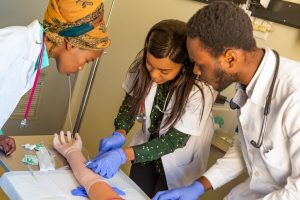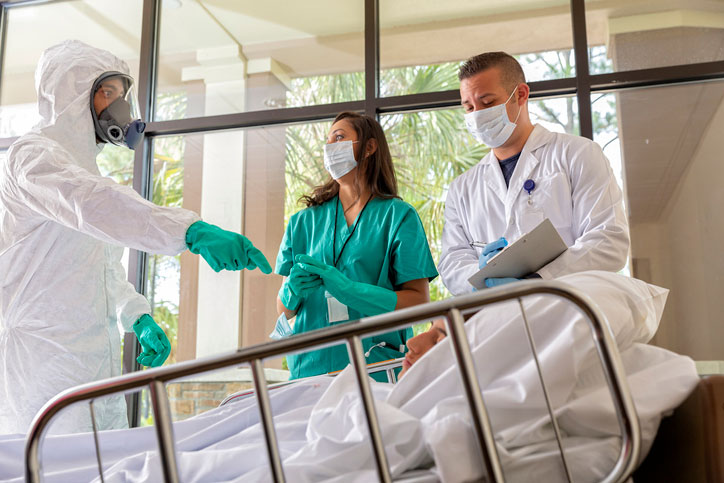Reviewed by Abbie Jacobs, RN, BSN
The gravity of the COVID-19 pandemic hit home early for students in graduate nursing programs. Even as some schools shut down, and other programs shifted to entirely online courses, both nurse-educators and working RNs taking graduate courses started dropping out or putting their degrees on hold. Hospitals were calling, then screaming, for more staff to deal with a steadily rising tide of coughing, feverish patients stumbling into emergency departments and slowly filling ICU beds.
As the rest of the country slowly started to shut down and feel the impact of the crisis, you were already neck deep in it. For you, COVID-19 isn’t just a rough patch in your schoolwork, it’s likely to be a career-defining event. You know life as an APRN in a post-pandemic society is going to be different, but you don’t really even have time to think about that right now.
At least you have one thing to cling to right now that few other people have – your position offers you the opportunity to actually do something in the midst of the crisis, to make a difference to save lives and squash the outbreak. It’s a hard choice, with serious consequences, but it’s also why you went into nursing in the first place.
Clinical Requirements Make Nursing Education Infinitely More Complicated in the COVID-19 Era
The Short-term Issues Are Eclipsed by Long-term Changes in Healthcare and Advanced Nursing
Difficult Decisions Ahead for Graduate Nursing Students and Schools
Handling Your Own Health and Well-Being in a Healthcare Crisis
Clinical Requirements Make Nursing Education Infinitely More Complicated in the COVID-19 Era

The major complication for graduate nursing students and nursing programs right now is the hands-on, practical nature of the education itself.
In normal times, that’s a great benefit – experiential learning with real patients under the guidance of preceptors working in the field who can pass along their knowledge of the latest methods and practices.
Now, those patients may be infectious, and the preceptors are far too tired and distracted to teach. The general array of skills you might learn are not on tap, either… if you needed an in-depth education in infection control procedures and oxygen management and ventilation for an entire quarter, you’d be covered, but you can forget about training in the general skills you’ll use across the course of your career – most hospitals have put it all on hold.
Clinical Rotations Are Being Cancelled Across the Country
For all these reasons, as well as reasons of liability, many schools have put clinical rotations on hold indefinitely too. Even for nurses who are able to use their current positions for clinical hours find that both faculty and preceptors just don’t have the time to provide the supervision. That means all that overtime you are putting in won’t be able to be used to meet APRN certification and licensing requirements.
In other cases, the decisions are being left to placement sites and students. As the virus hits some areas harder than others, some programs may be able to ride it out with less impact than others.
Students and Preceptors Are Being Called in to Work
Even if you’re not at a point where clinical hours figure in to your current coursework, you might find classes being discontinued simply because there is no one to teach them and very few students left to attend them. Qualified RNs and APRNs are in short supply, and many feel a duty to drop academic pursuits and go all-in to support the fight.
Even non-RN students are joining the effort. Yale’s School of Nursing has tapped students and preceptors, enlisting the help of more than 300 volunteers to help their affiliated healthcare system augment surge capacity during the crisis.
And states are making it easy for programs to get APRNs into the workforce fast in the midst of the current crisis. Wisconsin, for example, has developed temporary expedited graduate nursing license requirements and eliminated collaborative practice requirements to get more providers to the front lines.
With the ranks of both students and preceptors being depleted, it’s an open question whether colleges will choose to suspend or continue graduate nursing programs.
The Short-term Issues Are Eclipsed by Long-term Changes in Healthcare and Advanced Nursing

It’s not just the immediate, day-to-day demands of nursing during COVID-19 that are likely to impact the profession and your decisions to continue or put things on hold. There are long-term implications that remain unclear today, but could dramatically change your career path, and the entire profession.
The Journal of American Medicine is calling for dramatic alterations to medical school beginning in the fall of 2020, suspending an entire year in favor of recruiting the incoming class to a dedicated crash-course and year of service exclusively in public health. Although similar calls from the nursing community have yet to emerge, it offers some indication of the broad strokes that may shift the medical community before you even graduate.
Other possible long-term effects you may want to consider include:
Shifts in Demand for Specialty Practice Areas – Will the crisis cause a shift in priorities when it comes to hiring trends? Will APRNs with a public health nursing focus be particularly in-demand as the focus of healthcare funding changes to prevention and response capability when catastrophes like this arise? Will Clinical Nurse Specialists, with their systems perspective, start to occupy a more prominent role on par with nurse practitioners? Will there be a surge in pregnancies calling for more certified nurse midwives about nine months after the stay-at-home orders end? All these questions could have implications for you and your particular APRN track.
Expansion of Independent Practice – With extraordinary circumstances collapsing many requirements for collaborative agreements in states that require them, the AANP is likely to press forward with their long-term campaign to junk these requirements entirely. With NPs and other APRNs proving themselves during the crisis, many of the historical objections to autonomy and prescriptive authority may fall by the wayside, opening up opportunities you might not have had previously.
Insurance Industry Reforms – The disparity in fatality numbers between the wealthy and poor are likely to fuel increasing dissatisfaction with the current structure of the American healthcare system and calls for reform. The fact that employer-based insurance systems fall apart with mass waves of unemployment that come at the same time as a pandemic reveals a gaping hole in the system that policymakers will need to patch. The effects this could have on APRNs is uncertain, but quite real.
Healthcare System Reinforcements – In a similar fashion, the reliance on elective procedures and primary care billing to keep the healthcare system afloat is likely to come under scrutiny. Even as demand for professional nursing staff and clinicians has skyrocketed, mass layoffs have rocked non-critical care providers as the singular focus on COVID-19 treatment has chopped revenue levels for healthcare organizations. More resilience is likely to be built into the system, which could improve employment prospects and job security for APRNs in essential roles.
If your mind is spinning already, you’re not alone. Most nurses and nursing schools face some difficult choices in the months ahead.
Difficult Decisions Ahead for Graduate Nursing Students and Schools

The most sobering fact about the pandemic may be that we are still in only the early days of it, even as recent reports about the flattening of the curve tend to give the impression that we’re over the hump. Although some states and cities are most certainly having success in flattening the infection curve and keeping it within manageable ranges, there remains a great deal of uncertainty about the long-term trajectory of the pandemic and the policy response to it.
Schools that are open now, even online, may shutter by spring. If a projected second wave emerges in the fall, they are going to be looking at significant disruptions at that time too.
On the other hand, the situation also points to the pressing need to continue producing highly trained nurses capable of handling the situation. Demand for healthcare professionals was increasing rapidly even before the life-threatening pandemic came to town. Schools will continue to feel the pressure to re-open programs, although you may see significant restructuring to accommodate the situation. That might include:
- Expedited coursework and reduced graduation requirements
- More flexible program scheduling
- A push to increase acceptance of virtual simulation hours to meet clinical requirements
It’s still very early in the fight so most schools and state licensing boards have not come to any concrete resolutions on these questions yet. The California Board of Registered Nursing is already considering increasing acceptance of virtual simulations for clinical rotations, for example, while at least 14 other states have eased requirements for telehealth practice and are processing reciprocal licenses quickly for nurses coming from out-of-state.
One thing that has been common, and easily accomplished, is that on-campus classwork is moving online. In fact, many existing graduate nursing programs already run mostly or partly with online classes, and most nursing schools have the right technical capabilities to easily shift to an online format.
Handling Your Own Health and Well-Being in a Healthcare Crisis
 Getting to grips with the situation is a big hurdle for everybody right now… even if you weren’t watching your fellow students and preceptors heading out to deal with a deadly disease without basic PPE… even if you weren’t worried about your future, about your colleagues and your family.
Getting to grips with the situation is a big hurdle for everybody right now… even if you weren’t watching your fellow students and preceptors heading out to deal with a deadly disease without basic PPE… even if you weren’t worried about your future, about your colleagues and your family.
But the fact is, as a nurse, you are forced to wrestle with all those worries right now.
It’s a stressful time, but everything that is unfolding right now is also an opportunity. You are staring right in the face of the reason you signed up for your graduate nursing degree in the first place – your chance to help people and make a real difference.
Whether you are on the front lines or still studying to prepare yourself for that role in the future, hang on to the dedication and belief in yourself that put you where you are right now. Your training is giving you the chance to understand a disease that is a mystery to others, and it’s giving you the tools to fight it and win. That’s a chance that millions of other people would love to have right now.
Nursing schools and colleges are being hit hard, but there are dedicated staff who are still on the job and working hard to help you get things figured out if you’re sticking with your program right now. While on campus services of all sorts have closed, schools are moving at light speed to get services online to support you.
Many schools are setting up dedicated resource webpages just to help students adjust to the sudden disruptions. And if that’s not enough, so have various state departments of education and nursing associations, such as the NASN.
And, as tired as they are, remember you can always lean on your fellow students and colleagues, whether you’re back on the job or just starting spring semester… your colleagues and classmates will be there for you, just as you’ll be there for them in stressful times.
You can be forgiven for forgetting it with so many real tragedies happening right around you, but doctors, nurses, and other healthcare professionals are the heroes of the day. Donated meals, PPE fundraising drives, hotel chains offering free accommodations near hospitals for doctors and nurses worried about dragging the infection back to their families… America has got your back right now. Know that your efforts now and in the future are appreciated and important to all of us.





